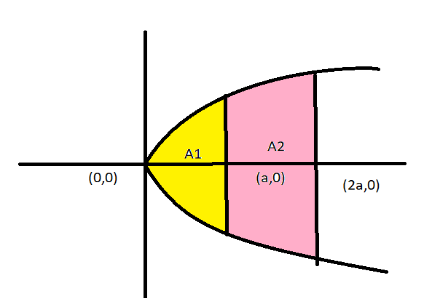Question
Question: If \({{A}_{1}}\) is the area of the parabola \({{y}^{2}}=4ax\) lying between vertex and the latus re...
If A1 is the area of the parabola y2=4ax lying between vertex and the latus rectum and A2 is the area between the latus rectum and the double ordinate x = 2a, then A2A1=
(a) 22−1
(b) 71(22+1)
(c) 71(22−1)
(d) None of these
Solution
First look at the definitions of latus rectum, double ordinate. Find the points through which they pass in terms of a. Now integrate the curve to find the area. Find the both areas in terms of a. Now divide both the results to get the value they are asking in the question.
Complete step by step answer:
Given equation of curve in the question is written as: y2=4ax
Latus Rectum: It is the line segment perpendicular to the axis of parabola and passing through the focus.
Double ordinate: any perpendicular to the axis of parabola is called double ordinate.

By drawing a parabola y2=4ax, latus rectum, double ordinate at x=2a and marking area A1, A2 as given in the question, we get:
Now the area A1 is the area between vertex and latus rectum. So, A1: shaded area from x=0 to x=a.
Area A2is the area between latus rectum and ordinate at x=2a, So, A2: shaded area from x=a to x=2a.
We know area of curve y=f(x) from x=x1 to x=x2 is
A=x1∫x2f(x)dx
Here we have equation as y2, So, applying square root:
y=4ax
Now we do from 0 to a we get with x-axis but we need total bu symmetry we say ir is multiplied by 2,
A1=2a∫a4axdx
By basic integration, we know that ∫xdx=23x3/2
By substituting this into above area, we get it as:
A1=24a23x3/2a0
By substituting limits and simplifying, we get it as:
A1=2×2a1/2×a3/2×32=38a2
Similarly, if we do for x=a to 2a we get A2 as:
A2=2a∫2a4ax
By substituting integral formula, we get it in the form of:
A2=24a23x3/2a2a=38a×a3/2[22−1]
By dividing the both area terms with A1 at top, we get
A2A1=32a2(22−1)38a2=22−11
By multiplying and dividing with 22+1, we get the term as:
A2A1=22−11×22+122+1=71(22+1)
So, the correct answer is “Option B”.
Note: Be careful while taking points. Second area is from the latus rectum generally students confuse and take it from x=0. But the lower limit is x=a. if you take x=0 you get the wrong answer. Be careful while rationalising. As most rationalising methods give denominator 1 students tend to write it 1 as default, here it is 7.
